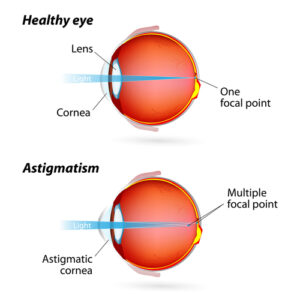Cataracts occur when the natural lens in your eye becomes cloudy. As it grows, the clouding becomes thicker and blocks light from reaching the retina, causing blurry vision.
Luckily, you can restore your clear vision by having your cataracts removed. The cloudy natural lens is taken out and replaced with a clear, artificial intraocular lens (IOL) during cataract surgery.
IOLs are put inside your eye and don’t require routine replacement or extra care. Thanks to cataract surgery, you can reduce or even eliminate your need for glasses, depending on the type of lens you choose.
Keep reading to find out if you’ll still need glasses after having cataract surgery!
Monofocal IOLs

If you pick a standard lens, known as a monofocal IOL, you’ll still require glasses after cataract surgery. Choosing a monofocal IOL provides excellent vision at only one distance: near, far away, or intermediate distances.
You can wear glasses for intermediate and distance vision if you prefer improved vision while reading. Others may want clear distance vision and use glasses for up-close vision.
For people who wish to minimize their dependence on glasses as much as possible, premium IOLs can be the perfect solution. With premium lenses, you’ll attain good vision at various distances.
Seeing well at different distances helps you reduce your dependence on glasses while completing everyday tasks.
Premium IOLs
Cataract surgery with premium IOLs comes with out-of-pocket expenses since Medicare and other insurance plans don’t cover the costs. Even though premium lenses are more expensive than a conventional IOL, the benefits of premium lens implants far outweigh the additional cost.
There are different premium IOL options, including:
Toric IOLs

Toric lenses are specifically designed for patients with astigmatism. Astigmatism occurs when your cornea isn’t as round as it should be.
People with astigmatism have distorted or blurry vision at all distances. Before cataract surgery, one of the only ways to address astigmatism is with glasses or contact lenses.
By selecting a toric IOL, you’ll likely reduce your dependence on visual aids. The premium lens simultaneously allows clear focus at all distances and corrects astigmatism.
Many patients who choose a toric lens are excited to discover they no longer rely on glasses all the time, allowing them to see more clearly than before.
Multifocal IOLs

Want to see clearly at multiple distances? Multifocal lenses improve far, near, and intermediate vision, giving you greater freedom to live an active lifestyle.
Following cataract surgery, many patients who choose multifocal lenses never wear glasses or may only use them for reading small print. These IOLs also reduce presbyopia considerably, enabling you to see everything close to you with better clarity without needing reading glasses.
Accommodating IOLs
Accommodating lens implants give you crisp near and distance vision. They can also address presbyopia and reduce your dependence on reading glasses.
Just as the name suggests, accommodating IOLs work by moving forward and backward when the muscles in your eye contract and relax. This action provides functional close-up sight and excellent vision when looking at things at an arms-length away from you.
Choosing Monovision

Another option that some patients choose is monovision. With monovision, one lens put in the eye is for far distances, while in the other eye, the lens is for seeing things up-close.
Both eyes coordinate well to deliver clear, blended vision at various distances. The lenses work because your brain automatically learns to select the required focus.
Because each eye has a specific distance it’s set for, you’ll still need glasses if you want to see things at other distances in between.
Tips for Choosing the Right IOL for You
There’s a variety of lenses to select from, but what’s ideal for you will depend on your visual goals and lifestyle needs after having cataract surgery. Here are tips for picking the perfect IOL:
Decide How Much You’re Willing to Spend
Since insurance doesn’t cover premium lenses insurance, you’ll have to pay out-of-pocket to get the IOL. Remember, premium IOLs deliver clearer vision across a range of distances.
Many patients who choose premium IOLs find them worth the cost because it allows reduced dependence on glasses and contacts. If you’re looking to achieve visual freedom, a premium lens can help get you there.
Consider Your Lifestyle

Think about your routine activities and favorite pastimes. Do you still want to live the same lifestyle after having your cataracts removed, or are you looking to see clearer without relying on glasses?
Asking yourself these questions will aid you in making the right decision. If you’re more physically active and love things like golfing, hiking, or playing tennis, a premium IOL will allow you to complete these tasks with more ease.
Determine If You’re Comfortable with Glasses After Cataract Surgery
Do you long for the day when you can finally stop using glasses? Premium lenses can give you the freedom you desire.
Even though it might not be entirely possible to say goodbye to glasses forever, you’ll still attain sharper vision with a reduced need to depend on visual aids.
Talk to Your Ophthalmologist
It’s important to discuss your choices with your eye doctor when selecting an IOL. They’ll recommend the ideal premium lens based on your personal goals and visual demands.
Experienced Cataract Surgeons
The expert cataract surgeons at Joshi Retina offer different intraocular lens options. You’ll undergo a comprehensive evaluation and consultation then get the best recommendation to help you achieve the greatest freedom from glasses.
Our goal is to customize your vision according to your unique needs and personal goals.
Schedule your appointment today at Joshi Eye Institute in Boynton Beach, FL, to start living a life without cataracts! Aren’t you ready to see clearly and love the world you’re in again?



